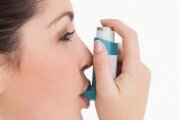Natural Treatments To Prevent Asthma Attacks
If you suffer from asthma and have ever experienced a severe attack, you’ll be only too familiar with the experience of not being able to “find your breath”. If not, it’s not hard to imagine how terrifying this must be.
Fortunately, if you’re a sufferer or know one of the 5 million people in the UK who has the condition, then there are natural remedies that can be used alongside conventional treatments to help prevent the onset and severity of an attack.
Conventional drugs have their limitations but can be life-saving for sufferers of chronic asthma
Because asthma is essentially an inflammatory reaction, you’d think that the logical treatment would be to prevent the inflammation from occurring in the first place. However, very few conventional drugs are able to do this.
The majority of conventional drugs are effective in alleviating symptoms and reversing the after-effects of inflammation, but are unable to treat the cause. However, even being able to alleviate symptoms alone can have life-saving consequences – especially during a severe attack.
The most commonly used drugs are inhalers such as salbutamol, salmeterol and terbutaline. They work by relaxing your bronchial tubes and improving the flow of air within your lungs. It’s important to be aware that they can cause unpleasant side-effects, so make sure you see your doctor immediately if you experience shaky hands, anxiety, headaches, palpitations or muscle cramps.
Drugs used in tablet form are theophylline and aminophylline, which also help to relax your bronchial tubes. A new drug that was launched recently as a preventative is montelukast, which helps prevent an inflammatory reaction from taking place. However, it doesn’t work during an actual attack and it can cause nasty side-effects, including dry mouth, skin allergies, dizziness, irritability and difficulty in sleeping.
Steroids, taken either by inhaler or in tablet form are also widely used, both in the prevention and treatment of an asthma attack. Steroids such as beclamethasone are thought to be relatively safe when used in inhalers, but the tablet form is only prescribed as a last resort in patients with severe asthma. This is because there is a risk of dangerous side-effects such as fluid retention, weight gain, diabetes and osteoporosis.
Know which foods can typically trigger an asthma attack
Many sufferers find that certain foods can worsen their asthma, due to a food intolerance or allergy. Typical culprits include foods like cow’s milk, nuts, chocolate, shellfish, strawberries and tomatoes. A full-blown asthma attack can then result when molecules of these problem foods enter your blood stream and irritate the inside of your bronchial tubes. A qualified nutritionist can help you determine if a food sensitivity is making your asthma worse, and will be able to tell you which foods you should avoid.
Instead choose foods known to help asthma, such as those high in essential fatty acids, the ‘good’ type of fat (omega-3 fatty acids), which help reduce the inflammation inside your lungs. They stimulate anti-inflammatory chemicals such as prostaglandin E1, which helps reverse the tightness in your tubes. Rich sources of fatty acids include flaxseed oil, perilla oil, and oily fish such as halibut, mackerel and salmon.
Foods rich in beta carotene (another beneficial anti-inflammatory) such as carrots, spinach and broccoli, are also thought to help reduce the risk of an attack.
A low-carbohydrate diet with small and frequent high-protein meals is recommended for people who take steroids for their asthma. This diet helps reduce the side-effects of long-term steroid medication, as it counteracts their damaging effects by preventing protein loss from your body’s tissues and also helps maintain healthy bones.
In addition, foods rich in antioxidants, such as fruit and vegetables, help protect your lungs from harmful toxins that can contribute to asthma. Antioxidants taken in tablet form such as 400IU of vitamin E and 30mg of co-enzyme Q10 are also helpful.
Include more onions in your diet. Although it’s still not known why this should be the case, several studies have found that raw or cooked onions can successfully help manage asthma.
Complementary natural remedies can help you breathe more easily
Used in conjunction with conventional treatments and the dietary advice outlined above, these nutritional supplements can go a long way in helping to prevent an attack.
In some cases, a combination of these approaches has been so successful that sufferers have been able to reduce their dependency on their inhalers. However it’s vital that you only do this under medical supervision, and that you’re monitored regularly by your doctor in case the asthma returns.
One nutrient that is proving successful is N-Acetyl Cysteine (NAC), which helps break up the mucus inside your bronchial tubes and helps expectoration. NAC has also been used in severe cases of asthma with good results. The dose is 600mg once or twice a day. It needs to be taken together with vitamin C (500mg) which also breaks up mucus. The combination of the two should work to unblock your bronchial tubes, improve coughing and ease your breathing.
The mineral magnesium taken in doses of 100mg a day (in a form called elemental magnesium), has been found to help asthmatics by reversing the tightening of the bronchial tubes.
What Happens During An Attack To Cause Your Breathing To Become So Laboured And Difficult?
The following five changes take place in your lungs when an asthma attack strikes:
1. The muscles around your bronchial tubes (rubbery tubes which transport air in your lungs) constrict, causing them to narrow.
2. The inside of your bronchial tubes then becomes inflamed, red and swollen – restricting the air supply to your lungs further still.
3. Special glands inside your bronchial tubes, which normally produce a small amount of mucus to keep them well lubricated, malfunction and create an increased amount of thick and tenacious mucus.
4. The result? Air is prevented from passing in and out of your lungs properly, making it increasingly difficult for you to breathe. This is usually accompanied by a great deal of wheezing (whistling of air passing through a narrow tube) and persistent coughing.
5. Depending on the severity of an attack, emergency treatment may be needed, as it can develop into a chest infection, or even cause heart failure and be fatal if immediate treatment isn’t sought.
Asthma can develop at any age, and an attack can be triggered by a number of causes. One of the main causes appears to be from environmental factors, such as an increased sensitivity to toxins from cigarette smoke, exhaust fumes and air-borne chemical pollutants from aerosol sprays and even perfume in
some cases.
Other causes include a hereditary susceptibility; allergies to pollen, pets, dust and certain foods; and medication – including both prescription and over-the-counter drugs.
Did you find this information useful?
Then why not get more expert health recommendations just like this delivered direct to your inbox?
"It is truly refreshing to read a newsletter on the topic of alternative medicine which is scientifically based and reviewed by professionals..." - Robert Sinott
We respect your privacy and will never share your details with anyone else.Disclaimer: This article is part of the Daily Health's extensive research archive. The research and information contained in this article was accurate at the the time of publication but may have been updated since the date of publication. Consult our most recent articles for the latest research on alternative health and natural breakthroughs.
Bear in mind the material provided in this content is for information purposes only. We are not addressing anyone’s personal situation. Please consult with your own physician before acting on any recommendations contained herein.
Sources:
J Invest Allergol Clin Immunol 1997, 7(4):210-215
Ter Ark 1997,69(3):31-33
JAMA 1996,275(9):699-700
Med Sci Res 1997,25(5):307-309
Biochem Pharmacol 1988, 37(23):4479-4486
Eur J Clin Nutr 1996,50(9):573-579
Clin Sci 1998,95(2):137-142
- Comments (6)
- Facebook Comments (0)
Comments are closed.











This is a good site… helpful stuff. Thanks and keep it up.
I had asthma when I was young at the age of 7 I am 30 years of age now and I can say I have never had an asthma Attack. I believe I no longer have asthma as I have never took the following.
Stay away from taking Inhalers
Don’t drink Milk
Herbal Tea everynight before going to bed helps a lot. Make sure its without the milk.
If they have a weez in their breathing give them a spoon of honey everyday.
And most importantly try to breath naturally when wheezing or having trouble breathing. You need to do this by taking deep breaths in and out.
My mother died of an asthma attack when I was 9. It was horrible to see her suffocate. I wish we knew as much then as we know today…
I’ve had asthma for years now. I suffer bad with it and sometimes I have to go into hospital .
My son is almost 5, and he has had 3 or 4 asthma attacks this past year. He has some allergy issues as well. I think I am going to try to get a referral to an allergist to have him tested. I am thinking he may be allergic to milk because he developed severe eczema when he was 4 months old, and it’s gotten better since I took him off cow’s milk.
My son is 5 and has asthma, I need to know which foods can trigger his asthma.